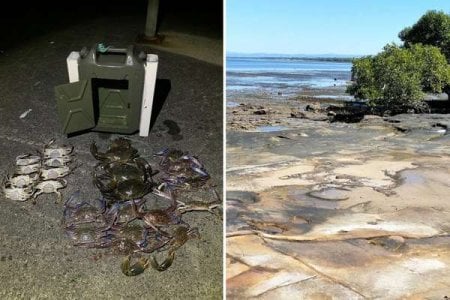Read this before your next fishing trip: One slip‑up could burn a $6,000 hole in your pocket.
By
Maan
- Replies 0
Few things stir community outrage faster than whispers of wildlife plunder along our coastline.
A routine patrol in Queensland has exposed a sly tactic that could have landed the culprits thousands of dollars in fines.
Here’s how a seemingly innocent outing unravelled into a cautionary tale for anyone casting a line in local waters.
Queensland’s Boating and Fisheries Patrol officers had been inspecting catches at Sandstone Point in Moreton Bay when they spotted three empty‑handed people heading to their vehicle.
Although the trio insisted they had caught nothing, officers soon located a jerry can bobbing on the shoreline containing blue swimmer and mud crabs—some undersized and eight female crabs that were considered no‑take.
A spokesperson for the Department of Primary Industries shared that officers ‘engaged with multiple groups of fishers who had regulated catches’ before patrolling the foreshore and finding ‘the jerry can containing mostly regulated crabs’.
Authorities believed the group had seen officers conducting inspections and had dumped the container ‘for collection later’.
Inside the makeshift container officers found ‘two mud crab claws separated from the body’, several undersized crabs and species that carried on‑the‑spot fines of $645 each.
In Queensland, Fisheries Infringement Notices included penalties of $322 for one to three undersized fish or crabs, $645 for more than three undersized fish or crabs, and $645 for any female crab, meaning a potential fine of about $6,000 loomed over the suspected culprits.
The spokesperson warned that ‘more serious offences may be referred to the Magistrates Court’.
Because officers had not observed the trio fishing, received no admissions and heard denials of ownership of the jerry can, they returned the crabs to the water after exhausting all lines of inquiry.
Earlier in the week, fisheries officers uncovered an ‘unlicensed and illegal’ homemade net at the mouth of the nearby Caboolture River in Deception Bay containing several dead cobia and live mud crabs, prompting officers to call the discovery ‘disappointing’.
They noted that illegal gear not only threatened fish stocks but also undermined the efforts of law‑abiding anglers.
The find reinforced that patrols would continue to enforce Queensland’s fishing regulations and safeguard marine resources.
In a previous story, we covered expert advice warning fishmongers about a common slip‑up during a major annual event.
You can catch up on that cautionary tale to see how it complements today’s crackdown.
Give it a read and stay ahead of costly mistakes.

Would tougher penalties deter would‑be poachers from taking protected catch, or are bolder patrols the real answer? Let us know your thoughts in the comments.
A routine patrol in Queensland has exposed a sly tactic that could have landed the culprits thousands of dollars in fines.
Here’s how a seemingly innocent outing unravelled into a cautionary tale for anyone casting a line in local waters.
Queensland’s Boating and Fisheries Patrol officers had been inspecting catches at Sandstone Point in Moreton Bay when they spotted three empty‑handed people heading to their vehicle.
Although the trio insisted they had caught nothing, officers soon located a jerry can bobbing on the shoreline containing blue swimmer and mud crabs—some undersized and eight female crabs that were considered no‑take.
A spokesperson for the Department of Primary Industries shared that officers ‘engaged with multiple groups of fishers who had regulated catches’ before patrolling the foreshore and finding ‘the jerry can containing mostly regulated crabs’.
Authorities believed the group had seen officers conducting inspections and had dumped the container ‘for collection later’.
Inside the makeshift container officers found ‘two mud crab claws separated from the body’, several undersized crabs and species that carried on‑the‑spot fines of $645 each.
In Queensland, Fisheries Infringement Notices included penalties of $322 for one to three undersized fish or crabs, $645 for more than three undersized fish or crabs, and $645 for any female crab, meaning a potential fine of about $6,000 loomed over the suspected culprits.
The spokesperson warned that ‘more serious offences may be referred to the Magistrates Court’.
Because officers had not observed the trio fishing, received no admissions and heard denials of ownership of the jerry can, they returned the crabs to the water after exhausting all lines of inquiry.
Earlier in the week, fisheries officers uncovered an ‘unlicensed and illegal’ homemade net at the mouth of the nearby Caboolture River in Deception Bay containing several dead cobia and live mud crabs, prompting officers to call the discovery ‘disappointing’.
They noted that illegal gear not only threatened fish stocks but also undermined the efforts of law‑abiding anglers.
The find reinforced that patrols would continue to enforce Queensland’s fishing regulations and safeguard marine resources.
In a previous story, we covered expert advice warning fishmongers about a common slip‑up during a major annual event.
You can catch up on that cautionary tale to see how it complements today’s crackdown.
Give it a read and stay ahead of costly mistakes.
Key Takeaways
- Patrol officers at Sandstone Point spotted three fishers leaving empty‑handed but soon found a jerry can with undersized and female crabs.
- The container held eight no‑take female blue swimmers, undersized mud crabs and detached claws, each offence attracting $645 fines.
- Potential penalties totalled roughly $6,000, though the trio denied ownership, and officers lacked evidence to press charges.
- An illegal net with dead cobia and live crabs discovered earlier in nearby Deception Bay underscored ongoing enforcement efforts.
Would tougher penalties deter would‑be poachers from taking protected catch, or are bolder patrols the real answer? Let us know your thoughts in the comments.








